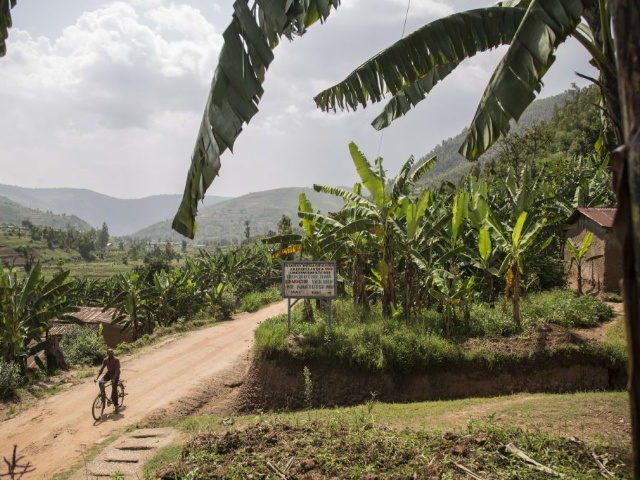Rwanda began a week-long commemoration on Sunday of the 25th anniversary of the 1994 genocide in which some 800,000 members of the minority Tutsi tribe, and those who sought to protect them, were murdered in a three-month rampage by members of the majority Hutu tribe.
Observers around the world took the opportunity to ponder the lessons of the Rwandan horror and wonder if a similar situation would play out any differently today.
Rwandan President Paul Kagame, who led rebel forces in a coup with Ugandan support that ended the genocide and has been in office since 2000, laid a wreath at the genocide memorial in a nationally televised event and said Rwanda became a stronger nation in the aftermath of the horrific killing spree — largely carried out with clubs, machetes, and cans of gasoline, accompanied by widespread rapes, beatings, and mutilations.
There are thousands of twentysomethings in Rwanda who were born as a result of rapes during the genocide and thousands more who grew up orphans. An estimated 250,000 bodies are buried beneath the memorial where he laid the wreath.
“There is no way to fully comprehend the loneliness and anger of survivors and yet over and over again we have asked them to make the sacrifices necessary to give our nation new life. Emotions had to be put in a box,” Kagame said.
“We are far better Rwandans than we were. But we can be even better still. We are the last people in the world who should succumb to complacency,” he said.
Kagame stressed the importance of forgiveness and reconciliation in his speech and said it was important to keep the awful events of 1994 clearly in collective memory because “genocide hibernates as denial.”
“Those among us who perpetrated the genocide, or stood by passively, are also part of our nation,” he said. “The willingness, in a number of cases, to tell the truth, pay the price, and re-join the community, is an important contribution. The witness of perpetrators is irrefutable proof, if any was still needed, that genocide happened.”
The Hutu rampage was touched off when then-President Juvenal Habyarimana, himself a member of the Hutu tribe, was shot down over the capital city of Kigali in 1994. Habyarimana was a military strongman who held power for only slightly longer than Kagame has, but few reflections on the genocide have ruminated on the dangers of keeping leaders in office long enough to develop personality cults.
Kagame is certainly softer around the edges than Habyarimana was, and Rwanda in 1994 was boiling with tribal resentments that hopefully will never reach critical mass again. Habyarimana died alongside another Hutu leader, President Cyprien Ntaryamira of Burundi. A Tutsi insurgent group was blamed for shooting down the plane, although the precise identity of the shooters has never been conclusively determined.
Latter-day students of the incident became convinced the culprits were more likely Hutu extremists hoping to sabotage the tribal peace talks Habyarimana and Ntaryamira were conducting, although one alternate theory advanced in the 2000s pointed to Kagame himself as ordering the attack to precipitate the war he would eventually win.
The Rwandan opposition sees Kagame as a dictator who uses memories of the genocide to justify the controls on media and political discourse that keep him in power. He won his last election in 2017 with 99 percent of the vote and took 93 percent in the one before that.
“Kagame has also been accused of holding too tightly to power. The U.S. State Department has reports of arbitrary detention, and disappearances of political enemies and journalists. State security forces have been accused of torture,” Voice of America News noted on Sunday.
On the other hand, Kagame has been praised for overseeing economic reforms and quality-of-life improvements in the country along with preserving social order. Kigali today is praised for its clean and peaceful streets.
However it began, there is no question the Rwandan genocide ended in unspeakable horror, leading directly to the creation of the International Criminal Court (ICC). The question of whether such organizations would prevent another genocidal atrocity remains open. Arguably several have occurred since the 1990s, and a few have come horribly close to succeeding as outright genocide or ethnic cleansing, such as the Islamic State’s assault on the Yazidis and other minority groups in Iraq and Syria.
Retrospectives on the 25th anniversary of the Rwandan genocide have a tendency to devolve into facile comparisons with “hate speech” or degrade into political attacks on U.S. President Donald Trump because he says mean things about the media. As Kagame’s speech on Sunday made clear, there was a lot more to it than heated rhetoric, and healthy societies are not one fiery speech away from becoming genocidal mobs or industrial slaughterhouses.
The international community was castigated after 1994 for not doing enough to stop the Rwandan genocide, but realistically in such matters, “international community” is shorthand for “America,” and Americans were not eager to get involved in an African civil war after what they saw in Mogadishu. They still aren’t. The consensus of modern politics is that nation-building is a fool’s errand and civil wars are bloody quagmires. It is not easy to spot the exact moment when a civil war threatens to become mass extermination.

COMMENTS
Please let us know if you're having issues with commenting.